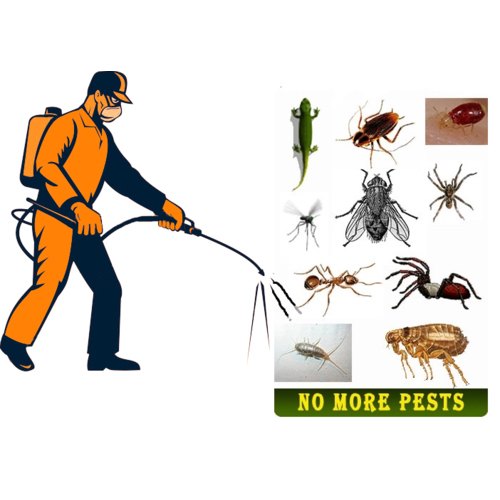Preventative Pest Control Services Chicago: The Most Effective Way to Avoid Unwanted Pests
Preventative Pest Control Services Chicago: The Most Effective Way to Avoid Unwanted Pests
Blog Article
Checking Out Numerous Techniques and Strategies for Comprehensive Bug Control in Residential Spaces
The landscape of pest control in property spaces has actually advanced dramatically, requiring a comprehensive understanding of various techniques that can be employed for effective administration. Typical chemical treatments, while reliable, are increasingly being complemented by environmentally friendly options and Integrated Bug Monitoring (IPM) methods.
Comprehending Pest Control Basics
Efficient pest control is vital for keeping a safe and healthy living setting. Recognizing the fundamentals of bug control includes acknowledging the kinds of pests that generally attack residential areas, the prospective dangers they posture, and the significance of preventative measures. Typical home parasites consist of rodents, bugs, and other undesirable animals that can compromise health, damage property, and cause health and wellness concerns.
An essential initial step in bug control is identifying the specific insects present. This can include inspecting locations such as kitchens, attic rooms, and basements, where insects are most likely to flourish. As soon as identified, it is important to comprehend their habits, reproducing cycles, and chosen settings, which can inform suitable control methods.
Preventive measures are essential to reliable insect administration. These include sealing entrance points, keeping tidiness, and reducing clutter to get rid of concealing areas. Furthermore, correct food storage and waste management can considerably reduce the attraction of a home for pests.

Standard Chemical Treatments
Among the different insect control methods, standard chemical treatments have actually long been utilized to deal with infestations in household areas. These therapies usually involve the application of chemical pesticides made to eliminate parasites such as insects, rodents, and other undesirable microorganisms. The effectiveness of these chemicals can differ, relying on the kind of insect, the formulation of the chemical, and the technique of application.
Common courses of typical chemical therapies consist of pesticides, herbicides, fungicides, and rodenticides, each customized to deal with specific insects. Pesticides, as an example, may target termites, roaches, or ants, while rodenticides are particularly created to manage rodent populaces. These chemicals are commonly offered in different kinds, including granules, sprays, and lures, permitting home owners flexibility in application.
In spite of their effectiveness, traditional chemical treatments elevate concerns concerning potential poisoning to humans, pets, and beneficial organisms in the atmosphere. For that reason, it is crucial for home owners to thoroughly follow application guidelines and security precautions to reduce risks. Integrated Pest Administration (IPM) strategies can match these treatments, making certain an extra holistic strategy to pest control while making the most of efficacy and security in residential settings.
Eco-Friendly Pest Control Options
Green pest control options are getting popularity as homeowners look for much safer and a lot more sustainable alternatives to conventional chemical therapies. These techniques focus on the health of both locals and the setting, reducing the impact of insect control methods.
One extensively taken on eco-friendly approach is the use of natural repellents obtained from vital visit the website oils, such as peppermint and citronella. These oils not just discourage bugs however additionally supply positive scents for indoor spaces. Diatomaceous earth, a powder made from fossilized algae, acts as an all-natural pesticide by damaging the exoskeletons of pests upon call, leading to dehydration.
An additional effective method entails promoting biodiversity in gardens and lawns. Introducing advantageous insects, such as lacewings and ladybugs, can naturally manage pest populations (Chicago wasp nest removal). Furthermore, employing traps made from biodegradable products can aid catch and get rid of insects without creating damage to the ecosystem
Normal maintenance, such as sealing access factors and correct cleanliness, further improves the efficiency of green bug control. House owners can take aggressive measures to stop infestations, making sure a more lasting living setting while efficiently handling pest-related issues.
Integrated Bug Monitoring Strategies
Implementing integrated pest monitoring (IPM) approaches offers a detailed strategy to pest control that stresses avoidance and lasting remedies. IPM integrates numerous techniques, concentrating on understanding parasite actions, life process, and ecological characteristics to lessen pest populations efficiently. This diverse approach prioritizes non-chemical methods, such as biological control, environment control, and cultural techniques, to decrease dependence on pesticides.
A foundational aspect of IPM is keeping an eye on and recognizing parasites precisely. When intervention is necessary, this includes normal assessments and the facility of activity thresholds to determine. By comprehending the particular bugs influencing domestic atmospheres, targeted interventions can be used, decreasing the chance of unneeded chemical applications.
Another essential component of IPM is informing property owners about the value of cleanliness and maintenance methods. By cultivating an environment that prevents pest infestations-- such as sealing entry points and handling moisture-- locals can considerably minimize the danger of insect troubles. Furthermore, when chemical controls are regarded necessary, IPM supporters for using the least poisonous alternatives to important site decrease ecological influence. Via these techniques, IPM not just addresses present insect problems but also fosters lasting practices that advertise long-term bug management success.
Preventative Procedures for Homes
To repel prospective pest problems, property owners should adopt a positive strategy that stresses preventative actions. This starts with keeping a organized and tidy home, as mess and food debris attract pests. Chicago wasp nest removal. On a regular basis vacuuming, sweeping, and cleaning down surface areas can considerably minimize the threat of infestations
In addition, securing entry points is crucial. House owners should evaluate home windows, doors, and structure fractures for gaps that can enable pests accessibility to the home. Making use of caulk and weather condition removing can efficiently obstruct these entranceways.
Correct food storage is one more essential step. Storing food in closed containers and immediately cleansing up crumbs or spills assists hinder rodents and insects.
Furthermore, handling outside settings can avoid pests from trespassing on residential spaces. Homeowners must make certain that drainage systems are operating well, and landscaping is kept neat. Trimming trees and bushes away from your house and eliminating standing water can further reduce insect habitats.

Verdict
In verdict, effective parasite control in property rooms demands a diverse method that combines typical chemical treatments with environment-friendly methods and Integrated Parasite Management approaches. By prioritizing preventative actions, such as keeping sanitation and sealing access factors, house owners can significantly reduce parasite occurrences.
Understanding the essentials of bug control involves recognizing the kinds of insects that frequently get into household areas, the potential threats they present, and great site the importance of precautionary steps.A crucial initial step in parasite control is determining the particular bugs present. Integrated Parasite Management (IPM) approaches can complement these treatments, guaranteeing a more alternative strategy to pest control while maximizing effectiveness and security in household setups.
Applying incorporated parasite management (IPM) methods offers a thorough technique to pest control that emphasizes prevention and long-lasting remedies.In verdict, reliable bug control in household areas requires a complex approach that combines conventional chemical treatments with eco-friendly techniques and Integrated Pest Monitoring methods.
Report this page